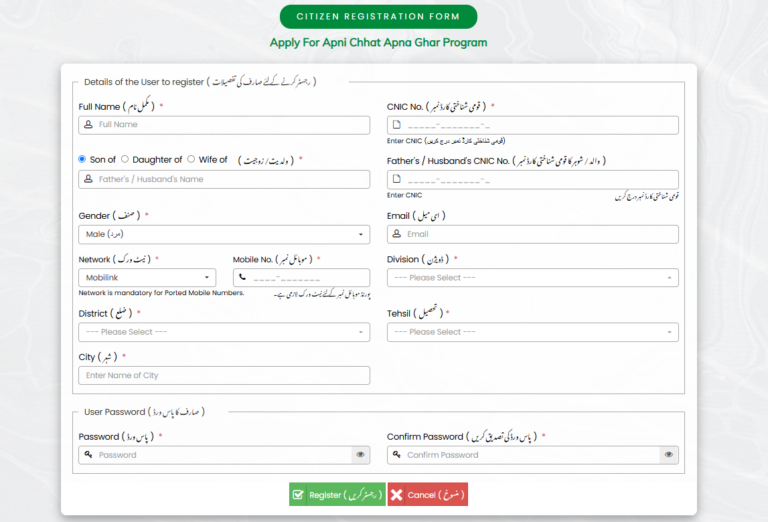Apni Chhat Apna Ghar Program: Affordable Housing for Punjab Residents
The Apni Chhat Apna Ghar Program (ACAG) is a groundbreaking initiative launched by Chief Minister Punjab, Maryam Nawaz Sharif, to provide affordable housing solutions to low-income families in Punjab. This program aims to construct 1 lakh affordable houses over the next four and a half years, offering a lifeline to families currently living in rented accommodations. The program is executed under the supervision of the Punjab Housing and Town Planning Agency (PHATA) and the Development and Public Health Engineering Department.

Key Features of the Apni Chhat Apna Ghar Program
Affordable Housing: The program targets low-income families, providing them with affordable housing options.
Three Execution Models: The initiative is divided into three models to ensure efficient implementation.
Loan Facility: Eligible families can avail of housing loans to construct their homes.
Online and Offline Registration: Applicants can register through the official website or visit their local Deputy Commissioner’s office for offline assistance.
How to Register for the Apni Chhat Apna Ghar Program
To apply for the ACAG program, follow these steps:
Step 1: Visit the Official Website
Go to the official ACAG website: acag.punjab.gov.pk.
Step 2: Fill Out the Citizen Registration Form
Click on the “Register” button on the top right corner of the website.
Enter the following details:
Full Name
CNIC Number
Father’s/Husband’s Name
Father’s/Husband’s CNIC Number
Gender
Email Address
Mobile Network and Number
Division, District, Tehsil, and City
Create a strong password (at least 6 characters).
Step 3: Confirm Eligibility
After logging in, confirm the following:
You are a permanent resident of Punjab.
You do not own any other house.
Own a plot of up to 5 marla (urban) or 10 marla (rural).
Step 4: Complete the Application Form
Fill in the required details, including:
Personal Information (e.g., date of birth, marital status, spouse details).
Property Information (e.g., plot size, ownership type, address).
Household Socio-Economic Details (e.g., employment status, monthly income).
Step 5: Upload Required Documents
Upload the following documents in JPG, PDF, or PNG format (up to 1 MB):
Land ownership documents.
Front and back copies of your CNIC.
Step 6: Submit the Application
Review all details and click the “Submit” button to complete the application.

Eligibility Criteria for the ACAG Program
To qualify for the Apni Chhat Apna Ghar Program, applicants must meet the following criteria:
Permanent Resident of Punjab: The applicant must be a resident of Punjab as per NADRA records.
Land Ownership:
Urban areas: Up to 5 marla of land.
Rural areas: Up to 10 marla of land.
No Criminal Record: The applicant must not be involved in anti-state or criminal activities.
No Bank Defaults: The applicant should not be a defaulter of any bank or financial institution.
NSER Survey: Previously, NSER registration was mandatory, but this condition has been removed.
Offline Application Process
For applicants who cannot apply online:
Visit the ACAG registration desk at your local Deputy Commissioner’s Office.
Submit the required documents and complete the application process with the help of staff.
Required Documents for ACAG Registration
CNIC (Front and Back Copies).
Land Ownership Documents.
Proof of Residence.
Recent Photograph.
Contact Information
For inquiries or assistance, contact the ACAG helpline:
Phone Numbers: 042-99213419, 042-99213428, 0800-09100
Email: info@phata.punjab.gov.pk
Official Website: acag.punjab.gov.pk
